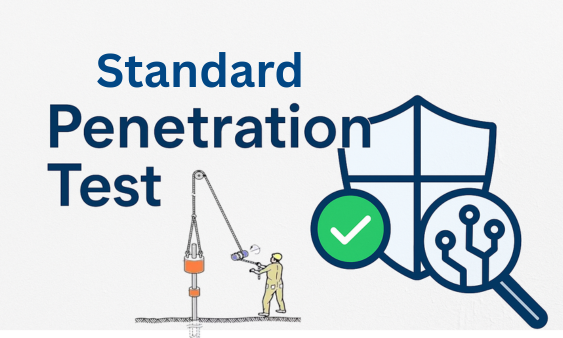
Why Standard Penetration Test is Critical in Site Investigation and Soil Evaluation
Soil evaluation is a vital process in construction and geotechnical engineering. For assessing the properties of subsurface soil, one of the most widely used and trustworthy methods is the Standard Penetration Test (SPT). Known for its simplicity, affordability, and reliability, SPT plays a pivotal role in ensuring the safety, stability, and longevity of construction projects. Whether it's a high-rise building, a bridge, or an industrial structure, understanding the soil beneath the surface is critical — and this is where SPT stands out.
What is the Standard Penetration Test (SPT)?
The Test is an in-situ dynamic penetration test designed to determine the geotechnical properties of soil. Conducted in a borehole, this test helps assess the relative density of granular deposits such as sand and gravel and the consistency of some cohesive soils.
The procedure involves driving a standard split-spoon sampler into the soil using a 63.5 kg hammer dropped from a height of 760 mm. It is noted how many hammer blows are needed to push the sampler 300 mm into the ground. In design calculations, this figure — also known as the "N-value" — indicates the soil's resistance to penetration.
Purpose of SPT in Site Investigation
SPT is a fundamental part of site investigation, which is the process of collecting information about the physical properties of soil and rock around a construction site. The primary purposes of SPT include:
- Determining bearing capacity of the soil
- Evaluating soil stratification
- Estimating settlement characteristics
- Identifying groundwater levels
- Assisting in foundation design
Why SPT is Essential in Soil Evaluation
1. Provides Reliable Soil Strength Data
SPT offers essential data on soil resistance, which is used to assess shear strength and bearing capacity. This is particularly important in determining the type and depth of foundation required for a structure.
2. Cost-Effective and Simple
Compared to other advanced geotechnical tests, SPT is relatively inexpensive and easy to perform, making it a popular choice even for small and medium-scale construction projects.
3. Widely Recognized and Standardized
Because IS 2131:1981 (India) and ASTM D1586 (USA) have standardized the test procedure, results are consistent and reliable across geographical boundaries. This makes it a preferred tool among engineers and consultants.
4. Supports Foundation Design
By understanding the soil’s N-values at different depths, engineers can design foundations that are structurally sound and safe. It helps in determining the allowable bearing pressure and depth of footing.
5. Detects Soil Anomalies and Weak Zones
SPT results can reveal unexpected soil behavior such as weak zones, loose pockets, or sudden changes in strata that might compromise a building’s stability if undetected.
6. Used for Liquefaction Analysis
In seismically active regions, SPT data is often used to analyze soil liquefaction potential, which is critical for earthquake-resistant design.
7. Essential for Construction Safety
By thoroughly understanding subsurface conditions through SPT, construction risks like settlement, slope failure, and soil collapse can be minimized.
SPT Procedure at a Glance
- Drilling a borehole using rotary or percussion equipment.
- Inserting the standard split-spoon sampler at the bottom of the borehole.
- Driving the sampler 450 mm into the soil using the standard hammer drop.
- Keeping track of the hits for every 150 mm increase.
- The number of blows for the last two 150 mm segments is added to determine the N-value.
Interpreting SPT N-values
| N-value | Soil Type | Interpretation |
|---|---|---|
| 0–4 | Very loose | Poor foundation support |
| 5–10 | Loose | Moderate to poor support |
| 11–30 | Medium | Acceptable for most structures |
| 31–50 | Dense | Good load-bearing capacity |
| >50 | Very dense | Excellent support |
Limitations of the Standard Penetration Test
While SPT is immensely useful, it has some limitations:
- Not accurate for soft clays or peat soils
- Affected by operator technique and equipment type
- Does not provide continuous soil profile
- Energy delivered can vary based on equipment
Despite these, when used in conjunction with other soil testing methods like Cone Penetration Test (CPT), lab analysis, and bore log interpretation, SPT remains a cornerstone of soil evaluation.
SPT in Chennai and Other Indian Cities
In rapidly urbanizing cities like Chennai, site-specific soil conditions can vary significantly. Performing SPT testing is crucial for projects ranging from residential buildings to industrial complexes. Local soil profiles — often a mix of coastal alluvium, silty clays, and sandy layers — demand proper geotechnical investigation for safe construction.
Professional geotechnical service providers in Chennai offer comprehensive soil investigation reports that include SPT results, bore log data, groundwater table details, and design recommendations.
Final Thoughts
The Standard Penetration Test is a time-tested, invaluable tool in geotechnical and civil engineering. It offers crucial data needed for safe, cost-effective, and structurally sound construction. While it’s not without its limitations, its benefits far outweigh the drawbacks — especially when combined with professional interpretation and supplemental testing.
If you're planning a construction project, never overlook the importance of soil testing and specifically, the SPT. It can help you avoid costly foundation problems and ensure the long-term success of your structure.

